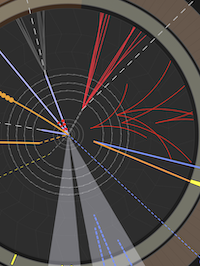Speaker
Description
We present a scenario capable of addressing dark matter (DM) through freeze-in and freeze-out mechanisms, depending on the region of the parameter space considered. In DM dynamics, the model features an interplay of thermal production along with sizeable production through feeble decay of associated dark fermionic partner, which finally freezes out to right relic density for a wide range of masses and couplings. Apart from the fermionic DM candidate, the model introduces two charged partners, one fermionic and another scalar, which often have delayed decays leading to distinct characteristics of long-lived particles (LLP) in the colliders like the LHC.
Our analysis shows that within the present scenario, LLP of decay length that could be probed at the LHC experiments are compatible with DM mass ranging from a few GeV to close to a TeV, as opposed to the requirement of keV-MeV DM in simple FIMP scenarios with LLP. With the change in the dark sector coupling, the LLP signatures change due to change in decay length. In addition, the model presents hitherto unexplored interesting possibilities in the LLP searches, like (i) LLP to LLP to SM cascade decays, which could be searched for within the LHC detectors and (ii) heavy neutral particle decaying within MATHUSLA with two bjets and large missing energy.

